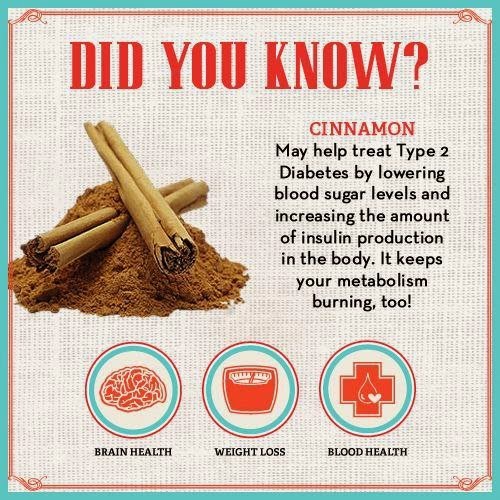Cinnamon
Cinnamon
is a sweet but pungent spice obtained from the inner bark
of the branches of wild cinnamon trees from the genus
Cinnamomum, which grow in tropical areas across South America, Southeast
Asia, and the Caribbean.
The
use of cinnamon dates back thousands of years and was very much prized among
many early civilizations.
Cinnamon,
often used in both sweet and savory foods in cooking and
baking, is increasingly being associated to improvements in the treatment of
conditions such as diabetes mellitus.
How does cinnamon affect diabetes?
A
couple of studies have established that cinnamon improves blood glucose control
in
people with type 2 diabetes. In the first study, 60 people with type 2 diabetes were divided into six groups. Three groups took 1, 3 or 6 g of cinnamon a day and the remaining three groups consumed 1, 3 or 6 g of placebo capsules. After 40 days, all three doses of cinnamon significantly reduced fasting blood glucose, LDL cholesterol, triglycerides, and total cholesterol.
people with type 2 diabetes. In the first study, 60 people with type 2 diabetes were divided into six groups. Three groups took 1, 3 or 6 g of cinnamon a day and the remaining three groups consumed 1, 3 or 6 g of placebo capsules. After 40 days, all three doses of cinnamon significantly reduced fasting blood glucose, LDL cholesterol, triglycerides, and total cholesterol.
In
a different study, 79 people with type 2 diabetes (not on insulin therapy but
treated with other diabetes medication or diet) took either a cinnamon extract
(equivalent to 3 g of cinnamon powder) or a placebo capsule three times a day.
After
four months, there was a slight but statistically significant decline in
fasting blood glucose levels in people who took the cinnamon (10.3%) compared
with the placebo group (3.4%), however, there was no significant difference in
glycosylated hemoglobin or lipid profiles.
As
a result of the scientific confirmation available, many health experts state
that cinnamon contains properties that are beneficial for blood sugar
regulation and treatment of type 2 diabetes.
However,
bear in mind that like many natural compounds cinnamon is yet to be medically
approved for prevention or treatment of any disease.
Other health benefits
Furthermore
to regulating blood glucose and lowering cholesterol, cinnamon has been shown
to:
- Reduce the proliferation of leukemia and lymphoma cancer cells
- Stop medication-resistant yeast infections
- Boost the body’s immune system
- Help in relieving indigestion
- Relieve pain in arthritis sufferers
- Have an anti-clotting effect on the blood
- Preserve food by inhibiting bacterial growth and food spoilage
- Be a great source of vital nutrients, including calcium, fiber, manganese and iron
The
majority of these health benefits are linked with use of true cinnamon (also
known as Ceylon cinnamon) and not cassia bark cinnamon, which is the species
involved in most diabetes research.


Diabetes Treatment - Remedies for Diabetes : https://www.youtube.com/watch?v=hEeE1PwTjUs
ReplyDeleteDiabetes Treatment - Remedies for Diabetes : https://www.youtube.com/watch?v=hEeE1PwTjUs
ReplyDeleteGreat information about the healthy effects of Cinnamon. Thanks!
ReplyDeleteMary
Jingle Jangle Jungle
Nature can truly be our pharmacy, if we only give it a chance.
ReplyDeleteWHETHER CINNAMON POWDER SHOULD BE TAKEN OR CINNAMON STICKS?
ReplyDeleteWITH WATER?
ReplyDelete